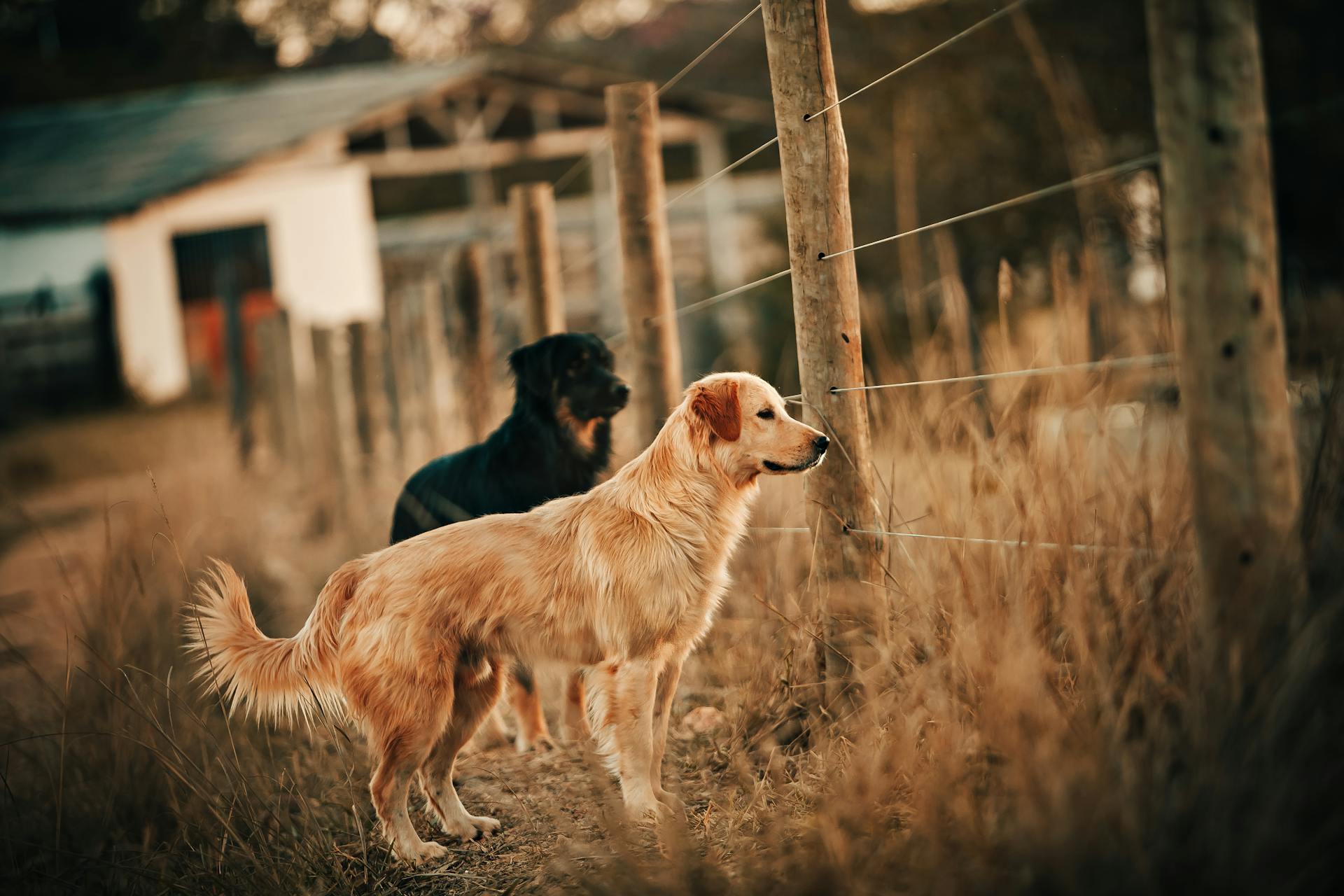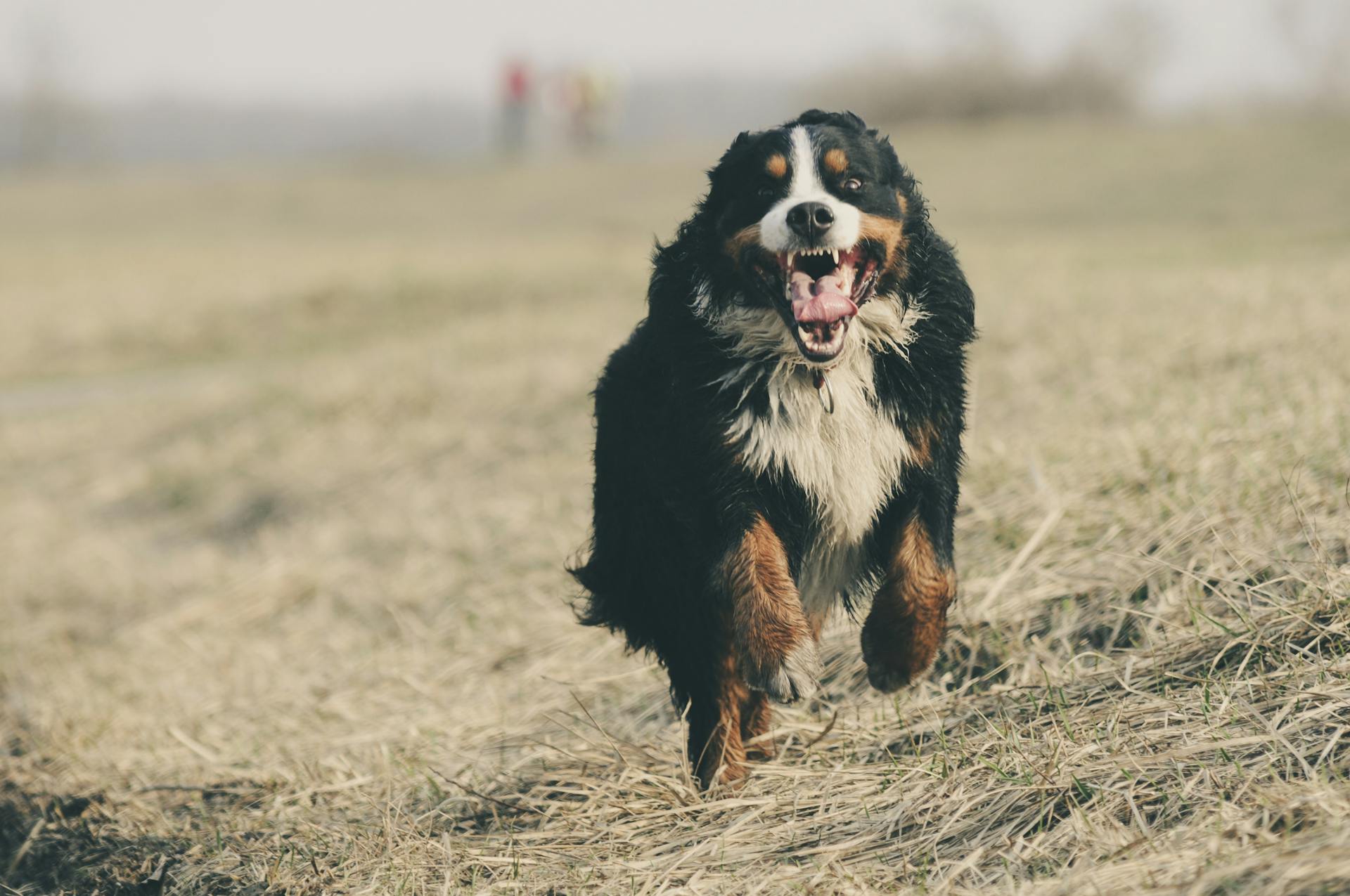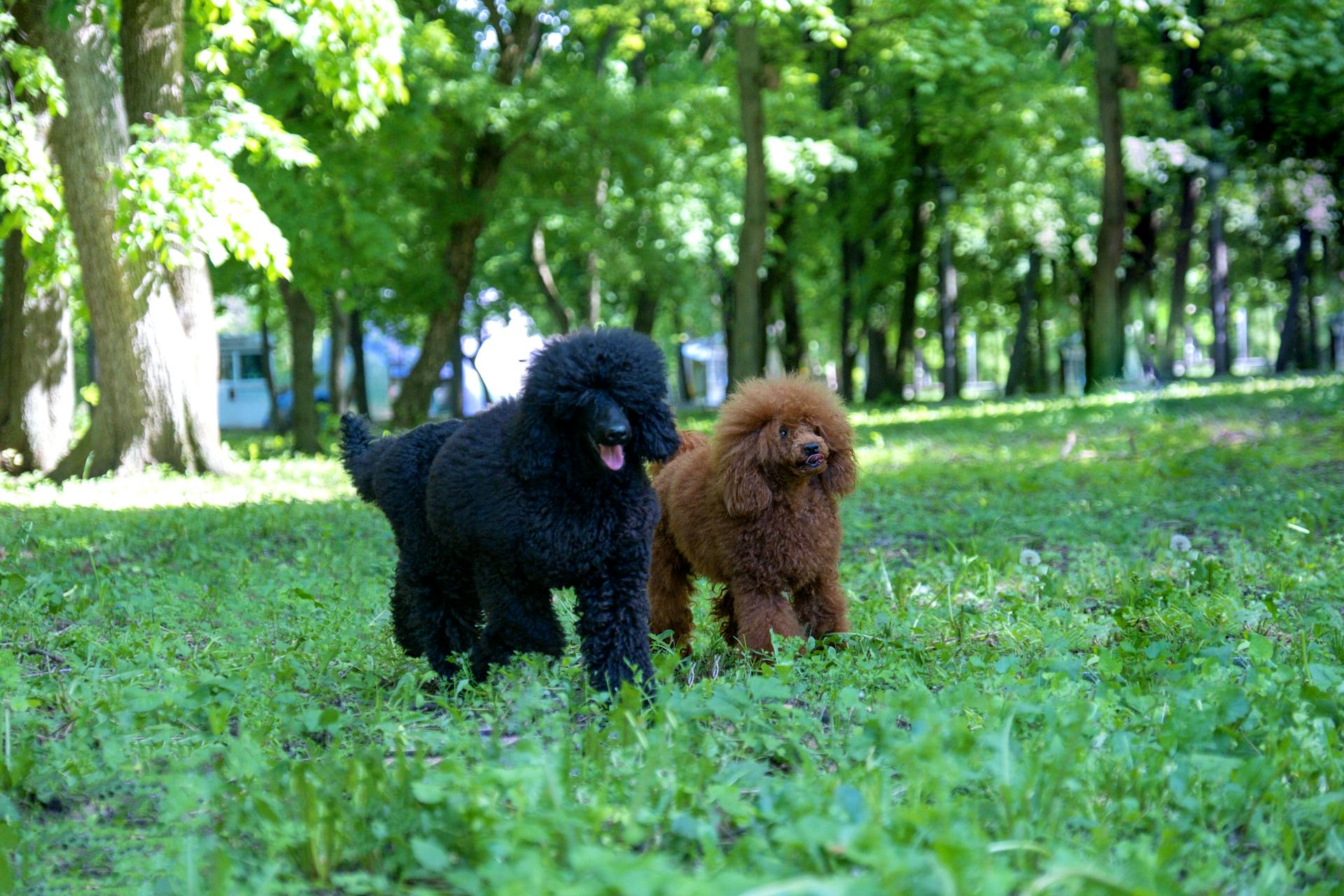
Here's a safety guide for dogs eating fries:
If you're planning to share fries with your furry friend, be aware that they can be a choking hazard due to their shape and size.
Make sure to cut fries into smaller pieces or strips to reduce the risk of choking.
Dogs can also experience gastrointestinal upset if they eat too many fries, so it's essential to limit the amount you give them.
Some dogs may be more prone to pancreatitis, a serious condition that can be triggered by fatty foods like fries.
Dangers of Feeding Dogs Fries
Dogs eating fries can be a recipe for disaster. French fries are typically made from potatoes, which can be okay for dogs in small quantities, but the way they're prepared makes a big difference.
The deep-frying process adds loads of unhealthy fats, which can lead to weight gain and obesity in dogs. Eating high-fat foods often can also increase the risk of pancreatitis.
Dogs have sensitive digestive systems, and the oils and spices found on fries can cause stomach upset. I've seen dogs get diarrhea and vomiting after eating just a handful of fries.
Excessive salt content in fries can lead to salt poisoning in dogs, symptoms of which can include vomiting, diarrhea, excessive thirst and urination, and in severe cases, seizures and death. Some dogs can be more sensitive to salt than others.
The seasonings often used on fries, such as garlic and onion powder, are toxic to dogs. Certain toppings and sauces, like ketchup, may contain xylitol, an artificial sweetener extremely toxic to dogs, even in small amounts.
Here are some potential health concerns associated with feeding dogs fries:
- High Fat Content: Weight gain, obesity, pancreatitis
- Salt and Seasonings: Salt poisoning, vomiting, diarrhea, excessive thirst and urination, seizures and death
- Digestive Problems: Stomach upset, diarrhea, vomiting
- Toxicity Concerns: Xylitol poisoning, garlic and onion powder toxicity
- Choking Hazard: Possible choking hazard or digestive tract obstruction
It's worth noting that some dogs may be allergic or sensitive to potatoes, and should avoid them altogether. Even plain, unsalted fries are not a healthy treat for dogs, and should be given in moderation, if at all.
Alternatives to Fries

If you're craving the taste of fries but want to share a safe snack with your dog, there are some great alternatives to consider.
Sweet potatoes are a safe and nutritious option for dogs, and they can be baked into crispy fries at home.
You can also use traditional potatoes, but it's best to feed them in small quantities and slice them thinly to prevent choking.
Vegetable treats like carrot sticks, edamame beans, and cucumber slices are also low-calorie snack options for dogs, but be sure to check with your vet to see which ones are right for your furry friend.
Commercial dog treats are another option, but make sure to choose ones that are specifically formulated for dogs and align with their dietary needs.
Here are some safer treats to share with your dog:
- Carrot sticks
- Edamame beans
- Cucumber slices
- Commercial dog treats
Remember, it's always best to consult with a veterinarian before introducing new foods to your dog's diet, especially if they have specific health needs or restrictions.
Benefits and Risks of Feeding Dogs Fries
French fries can be a tempting treat for dogs, but it's essential to understand the benefits and risks involved.
Dogs can get some nutritious elements like vitamins and minerals from potatoes, but only in moderation.
Potatoes are high in calories, and too many carbs can lead to weight gain.
The oil used to fry French fries is high in saturated fat and trans fat, which can cause pancreatitis, obesity, and other health issues in dogs.
Dogs can't process fats and salts the way humans can, making French fries an unhealthy snack for them.
Feeding your dog a steady diet of fries can lead to obesity, which is a serious problem that can shorten their lives.
Here are some key reasons why French fries are a bad idea for dogs:
- Fried in Oil: High in saturated fat and trans fat, which can cause pancreatitis, obesity, and other health issues.
- Salt and Other Seasonings: Can lead to dehydration or other complications due to excessive sodium intake.
- Blood Sugar: Can cause a spike in blood sugar in dogs with diabetes.
Preventing and Handling Food Poisoning
If your dog eats fries, it's essential to monitor them closely for any signs of food poisoning. One or two fries are unlikely to cause major problems, but eating more can lead to dehydration, diarrhea, vomiting, and even salt poisoning.
To prevent food poisoning, keep an eye on the ingredients in your fries. Some fries have added toxic ingredients like onions, garlic, mustard, or ketchup, which can be extremely dangerous for dogs in any amount. Fries with these ingredients are best avoided altogether.
To handle food poisoning, give your dog plenty of water to combat the salt. Monitor their behavior for signs of dehydration, diarrhea, vomiting, or other adverse reactions. If you notice any of these symptoms, contact your veterinarian right away. If your dog is showing severe symptoms like hives, swelling, difficulty breathing, confusion, seizures, or coma, contact your emergency veterinarian immediately.
Some common side effects of food poisoning in dogs include vomiting, diarrhea or loose stools, upset stomach, excessive thirst or dehydration, and changes in urination. If these symptoms last longer than 12 hours or become extreme, talk to your veterinarian.
Here are some common signs of food poisoning in dogs:
- Vomiting
- Diarrhea or loose stools
- Upset stomach
- Excessive thirst or dehydration
- Changes in urination
What to Do If You Eat Something Bad

If you eat something bad, it's essential to act quickly to minimize the damage. Drink plenty of water to counteract the effects of salt, which can cause mild dehydration.
Monitor your body for signs of a negative reaction, such as diarrhea, vomiting, and dehydration. These symptoms can occur if you consume too much salt.
Let your body recover by giving it time to process the bad food. If you've eaten something high in fat, you may need to go to the bathroom more frequently.
Here are some general steps to follow if you eat something bad:
- Drink plenty of water to stay hydrated.
- Monitor your body for signs of a negative reaction.
- Let your body recover by giving it time to process the bad food.
Remember, if you experience severe symptoms, seek medical attention right away.
Sickness Incidence
If your dog eats a few french fries, you probably don't have much to worry about, but some dogs are quite sensitive to the ingredients in fries, and some are even allergic.
The less serious side effects of french fries in dogs include vomiting, diarrhea or loose stools, upset stomach, excessive thirst or dehydration, and changes in urination.

These symptoms are usually not life-threatening, but if they last longer than twelve hours after your dog has eaten french fries or they start to become extreme, it's time to talk to your veterinarian.
Some dogs may suffer more severe side effects, such as severe allergic reactions, salt poisoning, and bloat, which can be life-threatening.
Here are the symptoms to watch out for:
- Severe allergic reaction: hives, swelling, or difficulty breathing
- Salt poisoning: confusion, seizures, vomiting, diarrhea, fever, drunk-like behavior, and coma
- Bloat: swollen stomach, drooling, panting, pacing, and signs of pain
Food Poisoning Symptoms
Vomiting, diarrhea, and loose stools are common symptoms of food poisoning in dogs. If these symptoms last longer than 12 hours after your dog has eaten something bad, it's time to consult your veterinarian.
Diarrhea can be a sign of food poisoning, and it's crucial to keep an eye on your dog's stool quality. If they're experiencing diarrhea, make sure to keep their water bowl filled and encourage them to drink plenty of water.
Dehydration is a significant risk factor, especially if your dog has eaten high-salt foods like French fries. Ensure your dog has plenty of water to drink, and monitor their behavior closely.
Intriguing read: How to Stop Dog from Eating Other Dogs Food

Here are some severe symptoms that require immediate attention from your emergency veterinarian:
Keep in mind that some dogs may be more sensitive to food poisoning than others, and it's always better to err on the side of caution. If you're unsure about your dog's symptoms or health, consult with your veterinarian for professional advice.
Sources
- https://www.dogster.com/dog-nutrition/can-dogs-eat-french-fries
- https://spotpet.com/blog/dog-tips/can-dogs-eat-french-fries
- https://www.petful.com/food/can-dogs-eat-french-fries/
- https://dogtime.com/dog-health/dog-food-dog-nutrition/67973-can-dogs-eat-french-fries-safe-for-dogs
- https://www.hepper.com/can-dogs-eat-french-fries/
Featured Images: pexels.com


